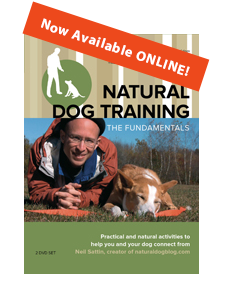There are certain questions that just come up over and over again. I thought I'd answer most of them in one central spot. Note that this is a work in progress - I'll keep you posted (via the blog) as more and more questions are answered here.
Why is Natural Dog Training better for my dog?
Most other training methods have a "mental" model of how dog training works. You either want your dog to do something (which you encourage with treats) or you don't want your dog to do something (which you discourage with punishment). Natural Dog Training, on the other hand, works with your dog's emotional nature - the way that your dog feels the world around them. You learn a completely new way of seeing the world - the way your dog does - and that's when you discover that your dog's behavior actually makes complete sense.
You see, a dog who is energized by the world is naturally attracted to certain things (prey-like things) and repelled by other things (predator-like things). The techniques of Natural Dog Training are unique in that they allow you to tap into this dynamic - the natural cycle of emotional stimulation/release within your dog. Your dog learns to be attracted to you no matter how energized they are (or distracting the environment), and your ability to finally satisfy your dog's deepest desires creates an emotional connection between the two of you that is more rewarding than any treat could be. Natural Dog Training gives you a reliable way to release your dog's stress and tension (the root of almost all problem behaviors). Since dogs are naturally social (and "obedient") when their prey drive is engaged, you'll find that obedience flows effortlessly as you work with Natural Dog Training techniques. Convinced yet?
How does Natural Dog Training help my relationship with my dog?
Your dog really only has one main question at any point in time - What do I do with my energy? Natural Dog Training gives you a way to consistently answer that question for your dog. You learn to tune into your dog's emotional state in the moment so you can give your dog's energy someplace constructive to go (building the relationship between the two of you). So while it's supremely satisfying for your dog, over time you'll also find that it's equally satisfying for you to be able to actually figure out, in the moment, what's going on with your dog - and address it, right then and there. You don't have to guess any more about what your dog really wants. And rather than puzzle over why a dog in a human world seems so...restless...you'll instead have a taste of what it's like to live in your dog's world - a world that's emotion-based, present, grounded - which is a mightily centering place for a human to be as well.
How is Natural Dog Training different than what the Dog Whisperer (Cesar Milan) does?
Cesar Milan is essentially a "dominance" trainer. The way he sees dogs, they are always engaged in pack behavior - and in his view the pack is controlled by the alpha dog. So in Dog Whisperer world, by being the "alpha", you are creating a structure for your dog that should ensure that they do what they're supposed to do. After all, the alpha commands it with their calm, assertive, behavior, right?
Natural Dog Training is different in many ways, but there is one key way that's most illustrative.
In Natural Dog Training, we see the pack dynamic as a "symptom" - instead of the root of dog behavior. The whole reason that packs exist is to hunt. So, if you will, imagine a whole pack of dogs (and your Sparky is one of them) out hunting a moose. Yep, a moose, the biggest, best prey - but it's also going to take all of those dogs to have some seriously coordinated behavior to get the moose - because a moose can be quite dangerous as well. So in this situation, do you think the alpha dog is telling all the others what to do? Of course not - no one is barking out orders! The pack's behavior is perfectly coordinated - revolving around the moose. So in Natural Dog Training, we choose to "Be the Moose" - since the prey actually controls the predator. Whatever the moose decides to do will determine what the dogs, in turn, decide to do.
The pack dynamic, the world of "dominance and submission", is what happens when a bunch of dogs are hanging out without anything better to do. However, as soon as a dog's hunting instincts are engaged, the dog is automatically social, fluid, able to adjust quite dynamically to many different kinds of situations. So rather than wrestle with the command and control of trying to be the alpha, we Natural Dog Trainers instead focus on harnessing the energy within our dogs, by being the Moose, and then allowing our dogs to do what they would do naturally if a Moose were around. And then channeling that response into behaviors that fit perfectly in the context of human society. You know - sit, stay, heel, come.
If I’m trying to “be the moose” does that mean my dog will want to eat me or attack me?
First of all, remember that "being the moose" is a metaphor. The purpose of being the moose is to be "that thing in the environment that attracts your dog no matter how energized your dog is". At all times you will be working with your dog's energy, channeling it into behaviors that reinforce that attraction AND are acceptable in human world. By being the moose you are not only learning how to become more preylike (i.e attractive to your dog), you are also learning how to embody the "predator" aspect of a moose as well - the quality that can stop a dog in its tracks. Part of the art of Natural Dog Training is learning how to balance those aspects of yourself, your inner mooseness, in a way that is in harmony with your dog at any given moment. So you ARE tapping into the part of your dog that wants to "eat stuff" - but your dog will be much happier playing tug-of-war, or heeling at your side, or pushing for their dinner.
Will Natural Dog Training work for aggression, hyperactivity, x, y, z, or other problem behaviors?
In a word, yes. Almost all problem behaviors boil down to three related things - your dog is experiencing too much unresolved stress, or your dog is having trouble relaxing as their energy increases, or your dog doesn't know what to do with all that energy. Natural Dog Training addresses all of these issues in a methodical way that helps your dog relax, de-stress, and do something productive with the energy that they're experiencing. The whole reason that I was led to Kevin Behan and Natural Dog Training in the first place was to solve my dog's aggression issues towards other dogs, and it was Natural Dog Training's effectiveness that led me to start naturaldogblog - so I could get the word out!
Natural Dog Training also teaches your dog to live a balanced existence - energy is expended outdoors, and the indoor environment becomes a place where behavior is calm and relaxed.
How frequently will I have to practice with my dog?
Once your dog "gets it" you can certainly scale back on your training. In the early stages, and since we do a lot of work with food, I suggest that you use your dog's mealtimes (and their meal) as an opportunity to work and play together. It gives a structure to your routine - and also keeps your time commitment manageable.
Will Natural Dog Training work for my older dog (can you teach an old dog new tricks)?
Absolutely. If you have a really old dog you might have to adapt some of the exercises to your dog's physical ability/stamina. But as an example, my dog was nearly 8 years old when I started working with her using Natural Dog Training methods. Since you're working with the CORE of what makes a dog a dog, you're working with something that doesn't go away with age. Personally I think that Natural Dog Training work helps keep our dogs young - emotionally vibrant and engaged in life.
Will Natural Dog Training work for my puppy?
How lucky your puppy is! Natural Dog Training is perfect for puppies, and there are many techniques for play-training that work with youthful puppy exuberance. These days I think that people tend to be a bit overzealous in what they expect of their puppies - so I personally advise clients to relax their expectations (and worries) and enjoy their dog's puppyhood with a slow evolution from play-training to work that's more structured.
How can I adapt these techniques for my really small dog or my really large dog?
Once you become familiar with Natural Dog Training techniques, it should be fairly easy for you to adapt them to your dog. As long as you're still honoring the point of the exercise, your dog won't care if your not doing it exactly the way I describe it. The Natural Dog Training DVDs do show the techniques with a variety of dogs, and every so often we feature photos/discussion here of how to work with dogs of varying stature and drive.
What if I have more than one dog?
Natural Dog Training will work for all the doggie members of your household - just make sure that you set time aside to work with each of your dogs individually.
Will my dog respond only to me, or will the rest of my family be able to use the same commands?
Once your dog knows what to do it will be very easy for your dog to generalize to other members of your family. It's great if other family members (particularly all the adults in the household) can actually participate in the training. There's plenty of room for more than one moose in a family, and it will help ensure that all the humans are on the same page in understanding how Natural Dog Training works. And, more importantly, in ensuring that everyone plays a role in helping your dog stay relaxed and stress-free.
How long before I start seeing a difference in my dog?
Not knowing your dog it's hard to say. However, I can tell you that many of my clients or people who have used my DVDs report noticing changes rather rapidly. You'll see a difference in your dog, and you'll also experience a difference within yourself! Natural Dog Training teaches you a way of experiencing your dog that helps you notice subtle shifts in behavior - coupled with many significant "a-ha!" moments as you and your dog work together.




